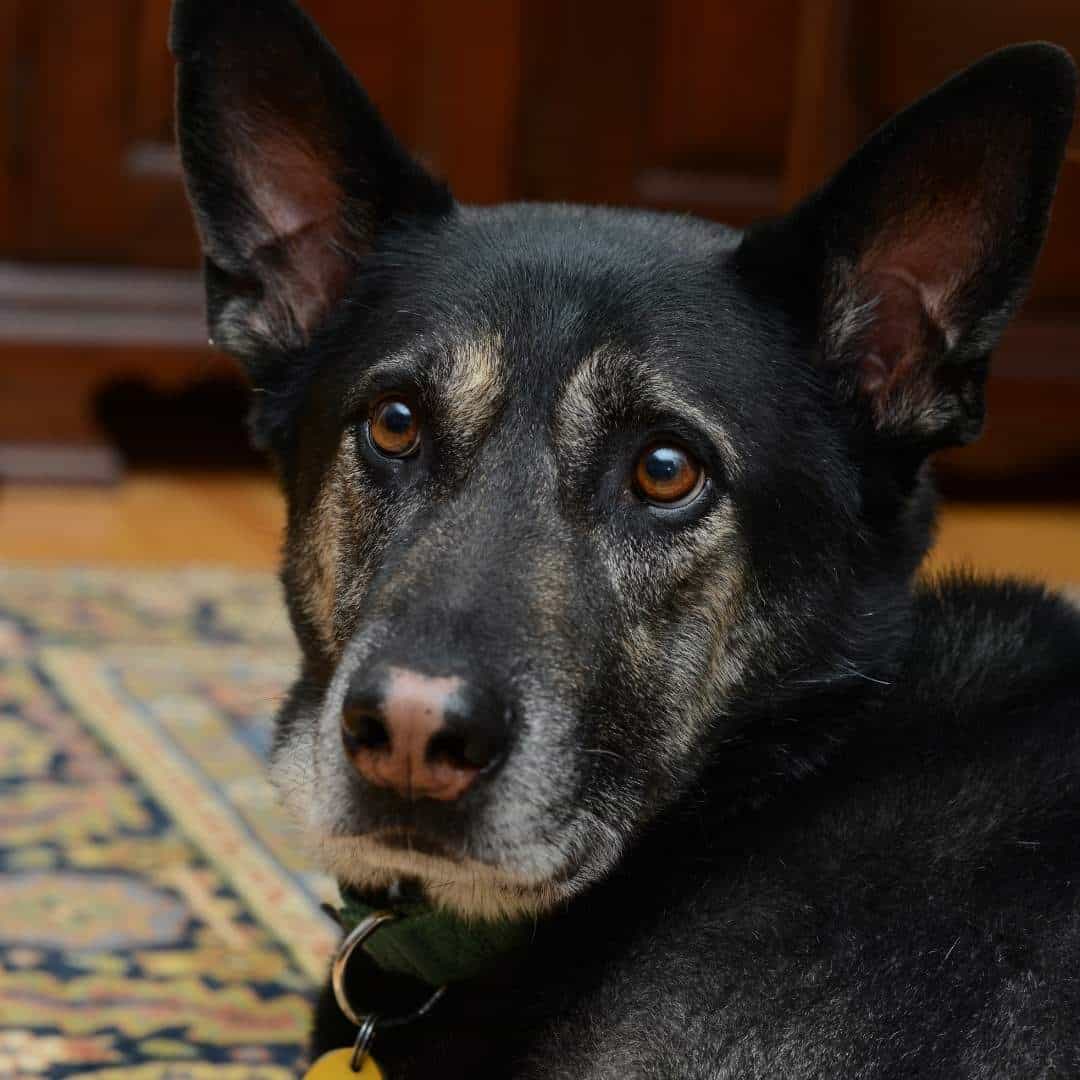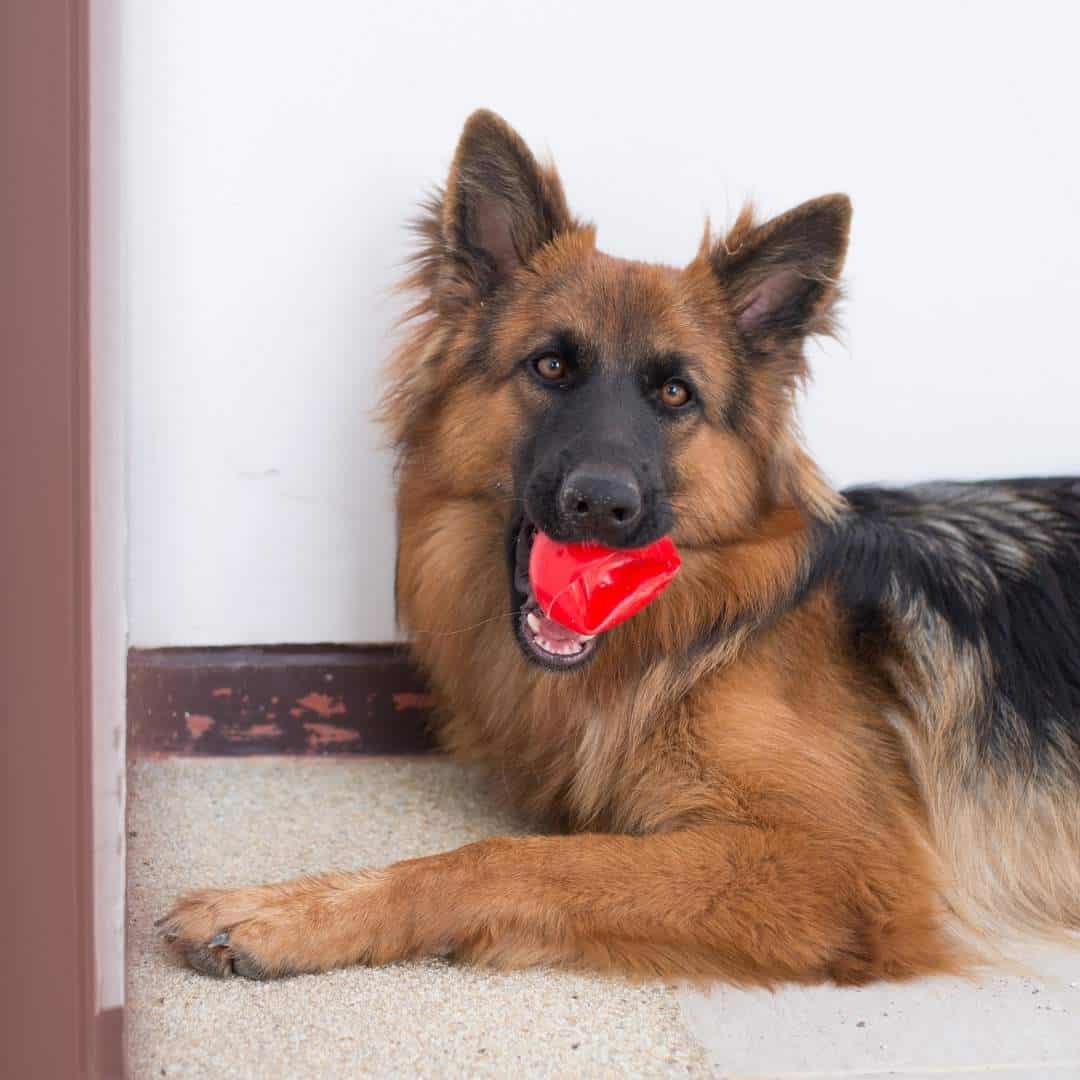These dogs have dense coats, but can german shepherds live outside during the whole year?
One reason for moving these dogs outside is the permanent shedding of their thick, medium double coat. It definitely can make a huge mess inside the house.
On the other side, GSD can do their job best when kept in the yard. They are well known as great watchdogs.
But can German Shepherds live outside all the time?

So, if you are planning to get this dog breed and keep it in your backyard, keep on reading. The following information should help you make the right decision.
Consider weather first
Winter is not a big problem, especially if you wing a way to keep the dog house warm.
The dog’s thick, double-coated fur will keep it warm in winter without a doubt. Things are quite different in summer, when their thick fur can turn into their enemy and cause heatstroke.
Symptoms of heatstroke in dog are vomiting, fainting, and lethargy. It is a very unpleasant condition and it can affect your dog during hot and humid summers.
Unless the weather is cool enough during summer you should not keep a German shepherd outside. Providing shade and a cooling mat can help. Other safety factors should be considered as well.
Don’t neglect their health
Dog owners keeping their pets outside can neglect aspects such as health and hygiene. When the dog is not under your scrutiny all the time, it can get quite dirty.
Dirty fur does not provide adequate protection to the dog and can lead to health issues. So, wash your dog regularly even if it lives outside in a dog house.
Don’t neglect their mental health either
Some pet owners mistakenly believe that if you give the dog different toys to play with, it will be OK.
In fact, German shepherds, like any other dog, are a major responsibility. The real reason why some people want to keep the dog outside is lack of training.
These owners often had unrealistic expectations from the dog and failed to do researching properly prior to getting the dog. The result is a dog without limits and which is not obedient enough to comfortably share your house with.
Getting a house for German shepherd and moving it outside your home can only make matters worse.
Their behavior will become even more difficult to handle. This dog breed is highly-intelligent and requires a lot of stimulation to thrive.
This is why many German shepherds are working as police dogs – they need a stimulating activity to keep them busy.
On the other hand, staying in your backyard all day won’t cater to their needs. As a result, they will get bored and develop behavioral problems.
One of these problems is that they will bark a lot. This will annoy both you and your neighbors. It’s no use punishing the dog – it only barks due to boredom and loneliness.
German shepherds need lots of affection

Unless you treat them as family members, German shepherds will not receive the full amount of love they need. As a result, they will misbehave and even become aggressive.
When a dog lives outside all the time, it will not attach to its family. It will not develop a need to protect and respect its owner.
Negative effects include constant barking, violence, attempts to run away, and breaking things. Lack of socialization also causes scratching, biting, chewing, and digging.
All these are effects of separation anxiety and your dog suffering from neglect. So, unless you are not planning to offer the love and attention the dog needs, don’t get a German shepherd.
Beware of wild animal attacks

Keeping your dog outside can make it prone to attacks from other animals. The common image is that of a dog attacking another animal or a person.
However, the situation can reverse. The following wild animals can represent a threat for your German shepherd:
- Groundhogs
These animals can reach the size of a large cat and have sharp claws and big teeth. Groundhogs will not intentionally attack a dog, but they can do it if they feel threatened. If you live in a new housing development, the chance of being visited by groundhogs is higher. The freshly dug earth is their perfect home and they can get quite close to your house.
- Squirrels
This cute little animal can transmit diseases such as plague and Lyme disease. They don’t even have to use their sharp teeth and claws.
They can also transmit diseases if a dog manages to catch and bite them.
- Skunks
Skunks are nocturnal animals and will sometimes visit residential areas. If a skunk crosses paths with a dog, it will spray the pet. It can even attack it as a reaction to surprise.
- Coyotes
Coyotes are bold and aggressive animals that will not hesitate to attack a large dog. They can even kill the victim and are responsible for a large number of missing pets.
- Rats
This pest is attracted by dog food and leftovers in your yard. Rats cannot cause serious injury to a dog, but can transmit potentially lethal diseases.
- Snakes
Reptiles are present in our everyday lives, even if we cannot see them. A dog wandering outside and sniffing the grass can be struck by a snake with no warning. Most snakes are not poisonous, but some species are.
- Racoons
Ever had your garbage ransacked by a racoon? These wild animals are curious and bold, but also ferocious. They will not hesitate to use their sharp teeth and strong claws to attack an aggressive or curious pet. The risk of racoons carrying rabies is the main danger for your dog.
- Deer
Deer are increasingly common in residential areas in the last years. They seem harmless, but can attack domestic animals like dogs with their antlers and hoofs. During spring, females are also aggressive because they have fawns close by and see anything as a threat. During winter, males are looking for does to breed and see as a challenge anything that comes in their way.
Benefits of letting your German shepherd inside your home

You don’t need to read this article to know your canine companion wants to get inside your house. They will use any opportunity to sneak in. They will beg and cry. And you shouldn’t feel guilty about allowing them in. Dog training specialists have outlined the following benefits of letting German shepherds inside:
- Healthy attachment
Your dog naturally wants to get attached to you and your family. This enables them to become loyal, loving friends. The dog will be easier to train when you show you care. Your furry friend knows when you care about them and will obey to make a good impression on you.
- No mess
Balancing indoor with outdoor time will provide the dog both with the attention and exercise they need. Running and playing outside will eliminate boredom and the dog will be less likely to break things.
- Adequate socialization
Make sure you socialize your German shepherd as much as possible, especially when they are young. Being in contact with other animals and people is vital for their well-being. Proper socialization makes it possible for the dog to have healthy relationships and interactions throughout its entire life.
Keeping the dog exclusively outside steals the opportunity of socialization and negative effects will be permanent. Without socialization, your German shepherd will become a danger to anyone having to enter your property and to other pets.
- Being part of the pack
The German shepherd’s strong pack instinct will make it want to spend a lot of time with you.
You will need to lead the dog and teach it what is allowed and what isn’t. if you don’t take the leader role upon yourself, the dog will have to take it.
And most times it will not be prepared for the role and will fail. Spending time close to the pack leader will enable the dog to define what it needs to protect.
The relationship between you and your dog will give it purpose and motivation to behave.
Related: Why Dogs Are Better Than Cats
This doesn’t mean they can’t spend time outdoors either
So far you may be tricked into thinking that the German shepherd is some sort of lap dog. Nothing further from the truth.
Your dog will enjoy spending large amounts of time outdoors. You will still need to accompany the dog; you should not let it unattended more than 8 hours a day. You will also need to provide different toys so it doesn’t get bored.
Many German shepherds can even sleep outside if you find a proper dog house. The rule of thumb is taking your dog outside for sleep only after four months of age.The first months of life are crucial for socialization and puppies are also more sensitive to diseases.
They cannot regulate their body temperatures as their double coat completely forms at 4 or 5 months of age. Time and patience are required, as the dog will hardly leave their cozy spot inside the home.
Bottom line
We recommend a combination of both. The German shepherd needs lots of space and exercise, but spending time with the human pack is vital for them. Without affection and stimulating activities, they will not be happy and well-behaved.
